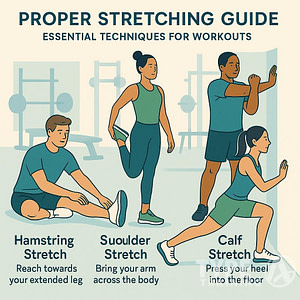Adopting certain lifestyle habits can have a profound impact on the longevity and quality of your life. Research, such as a study from Harvard T.H. Chan School of Public Health, suggests that integrating specific behaviors into your daily routine could potentially extend your life span significantly.
The promise of a longer life may be just a few habits away, with practices ranging from dietary adjustments to consistent physical activity playing pivotal roles.
Living longer is not just about adding years to life, but also about adding life to those years. By embracing a combination of healthy diet, regular exercise, and other key lifestyle choices, you could not only increase your life expectancy but also improve your overall well-being.
These habits, deeply rooted in scientific research, offer a blueprint for a more health-conscious existence.
Popular posts:
Maintaining these habits requires a commitment to prioritize your health each day. Whether it’s choosing the right nutrients for your body, finding time for daily physical activity, or avoiding detrimental habits like smoking, each choice you make can be a step towards a more vibrant and extended life. Embracing these habits may help you live not just longer, but also better.
1. Understanding Longevity
When you think about living a longer, healthier life, two critical factors come into focus: how long people typically live (life expectancy) and the genetic influences that may predispose you to a longer life. Below, you’ll find specifics on how these elements contribute to longevity.
Defining Life Expectancy
Life expectancy is the statistical measure that estimates the average time an individual is expected to live. This figure is influenced by a range of factors, including access to healthcare, lifestyle choices, and the prevalence of diseases which directly impact your disease risk.
For example, adhering to certain healthy habits, as outlined in a study from Harvard University, could potentially add years to your life expectancy by reducing the risk of chronic diseases.
The Role of Genetics in Longevity
While lifestyle choices have a considerable effect on life expectancy, your genetics also play a key role in longevity. It’s estimated that about 20-30% of an individual’s lifespan can be attributed to genetic factors.
This means that some aspects of longevity are inherited from your parents and their ancestors. Nevertheless, genetic predisposition doesn’t guarantee a longer life; it merely suggests the potential for aging well, indicating a possibly lower disease risk in comparison to the general population. It’s the combination of genetics and healthy living that maximizes your chances for a longer, healthier life.
2. Essential Healthy Habits
Adopting essential healthy habits can significantly enhance your longevity and quality of life. Making informed choices about your diet, exercise, body weight, and lifestyle activities has a profound impact on your health.
The Importance of Diet
Your diet plays a crucial role in maintaining overall health. Following dietary patterns such as those suggested by the Alternate Healthy Eating Index can be beneficial.
Aim for a balance of whole, plant-based foods, heart-healthy fats, and lean proteins. Monitor your intake of processed foods and sugar to protect your heart and reduce the risk of chronic diseases.
Exercise and Physical Activity
Regular exercise and physical activity are cornerstones of a healthy lifestyle.
Guidelines recommend at least 150 minutes of moderate aerobic activity or 75 minutes of vigorous activity per week, along with muscle-strengthening exercises on two or more days a week.
Staying active can help manage weight, improve mood, and decrease the risk of many health conditions.
Maintaining a Healthy Body Weight
Maintaining a healthy body weight is essential for your overall health.
Utilize the Body Mass Index (BMI) as a guiding metric to determine a healthy weight range for your height. Keep in mind that BMI is not a perfect measure; body composition and distribution of weight are also important factors.
Avoiding Harmful Habits
It’s critical to avoid harmful habits such as smoking and excessive drinking.
Engaging in not smoking at all can lead to a healthier cardiovascular system and lower cancer risk. If you choose to drink, practice moderate drinking, which equates to about one drink per day for women and two drinks per day for men as defined by Harvard Health.
3. Nourishment and Diet
A thriving long-term health strategy relies on a diet rich in various nutrients without overindulging in caloric intake. Striking the right balance in what you eat leads to better overall health and longevity.
Incorporating Nutrient-Rich Foods
Focus on integrating a wide range of vegetables and fruits into your diet as they are pivotal in providing vitamins, minerals, and dietary fiber.
Consume a variety of colorful produce to ensure you’re getting a comprehensive spectrum of nutrients. Regularly include nuts, beans, and whole grains for added protein and fiber which aid in satiety and digestive health.
The inclusion of fish serves as an excellent source of omega-3 fatty acids, pivotal for heart health.
Understanding Calorie Restriction
Calorie restriction, when done correctly, involves reducing your average daily caloric intake while still obtaining adequate nutritional value from your meals. This practice has been associated with increased lifespan in some studies.
Aim to minimize empty calories, especially those from sugar-laden foods and beverages, which contribute to excess calorie intake without beneficial nutrients.
Balancing Macronutrients
Boldly approach your plate with a balance of macronutrients—fats, proteins, and carbohydrates—to support your body’s needs.
Healthy fats, such as those found in nuts and fish, should be incorporated alongside lean proteins and complex carbohydrates like beans and whole grains. This balance keeps you fuller for longer, maintains energy levels, and helps maintain a healthy weight.
4. Activity and Exercise
Maintaining a healthy lifestyle involves a commitment to regular exercise, which reduces your risk of cardiovascular disease and contributes to longevity. There are several key components to including effective physical activity in your life.
Regular Cardiovascular Workouts
Cardiovascular exercise is essential for strengthening your heart and improving your circulation.
Engaging in activities such as brisk walking, jogging, swimming, or cycling for at least 150 minutes per week at a moderate intensity can help lower blood pressure and cholesterol levels.
This kind of exercise is directly linked to a decreased risk of chronic diseases, especially those related to the heart.
Strength Training
Beyond cardiovascular health, strength training plays a pivotal role in a well-rounded exercise regimen.
Aim to include at least two sessions per week that work all the major muscle groups.
Lifting weights, using resistance bands, or performing bodyweight exercises like push-ups and squats can increase muscle mass and metabolic rate, ensuring that your body remains strong and burns calories more efficiently.
Incorporating Moderate to Vigorous Activity
It’s important to vary the intensity of your workouts.
Moderate to vigorous physical activity, such as HIIT (high-intensity interval training) or plyometrics, can provide health benefits beyond standard moderate exercise.
In particular, this kind of training can improve cardiovascular fitness and is considered one of the low-risk lifestyle factors for increasing lifespan. However, it’s crucial to gradually build up to these intensities, especially if you are new to exercising, to avoid injury.
Related: Top Heart Rate Monitors: Chest Strap, Armband, Watch in 2024
5. Risks and Disease Prevention
image credit: healthyhartford.info
Adopting certain habits can significantly reduce your risk of developing chronic diseases and improve your overall health.
This section focuses on three key areas where making changes can have a profound impact on your longevity.
Combatting Obesity
Obesity is a major risk factor for a number of chronic diseases, including type 2 diabetes, heart attack, and stroke.
To combat obesity, you should focus on a balanced diet and regular physical activity.
The link to healthy diet information highlights the importance of eating nutrient-rich foods and maintaining a caloric intake that supports a healthy weight.
Managing Diabetes and High Blood Pressure
Diabetes and high
To manage diabetes, monitor your blood sugar levels and follow a diet that’s low in processed sugars.
Controlling high
Regular check-ups are essential to keep these conditions in check.
Reducing Heart Disease and Stroke
Heart disease and stroke are leading causes of death, but they are often preventable through lifestyle changes.
Avoiding tobacco, limiting alcohol consumption, and maintaining a healthy weight are crucial steps.
A lifestyle that includes stress management techniques and sufficient sleep can lower the risk of these conditions.
Be proactive in your health by monitoring cholesterol levels and keeping an eye on signs of cardiovascular distress.
6. Substance Use and Its Impact
image credit: drugfreeclubs.com
Adopting healthy habits can greatly enhance your longevity and quality of life. Among these habits, understanding and managing your substance use, including smoking and alcohol consumption, play a crucial role.
The Effects of Smoking
When you smoke, you not only increase your risk of lung cancer, but also a variety of respiratory diseases and heart conditions.
On a cellular level, the toxins from cigarette smoke damage your DNA and are a major contributing factor to the development of cancer.
Not smoking can significantly reduce these risks and contribute to better overall health.
Guidelines for Alcohol Consumption
Your alcohol intake should be moderated according to health guidelines to minimize risk.
For women, this typically means up to one drink per day, and for men, up to two drinks per day.
Excessive alcohol consumption can lead to addiction, liver diseases, and increased risk of certain cancers.
Staying within these limits is a key component of maintaining your health.
7. Psychological Well-Being
Enhancing your psychological well-being is linked to a longer life expectancy.
Focusing on practical strategies like managing stress and prioritizing high-quality sleep can improve your mood and potentially lower your risk of dying prematurely.
Stress Management
Practical stress management techniques are crucial for maintaining a positive mood and overall health.
Regular exercise and mindfulness meditation are effective tools for mitigating stress.
Incorporating even short periods of physical activity into your day can elevate your mood and reduce stress levels.
Mindfulness practices, such as deep breathing exercises or progressive muscle relaxation, can help you stay centered and calm.
Quality Sleep and its Benefits
Prioritizing high-quality sleep each night is one of the most beneficial habits you can adopt.
Aim for 7-9 hours of uninterrupted sleep to reap its full benefits.
High-quality sleep strengthens your immune system, bolsters your mood, and has been associated with a lower risk of dying from various health conditions.
Create a sleep-conducive environment by keeping your bedroom dark and quiet, and establish a regular sleep routine to signal your body that it’s time to rest.
Related: How to Sleep Faster: Tips and Techniques for Falling Asleep Quickly
Public Health and Policy
images credit: gapha.org/provide-your-input-on-the-10-essential-public-health-services/
Your lifestyle habits significantly shape your health, but public policies and social environments play a pivotal role in fostering those habits. Recognizing the interplay between these factors is crucial for understanding how you can live a longer and healthier life.
Influence of Public Policies on Health Habits
Public policies have a profound impact on your health habits.
For instance, the Centers for Disease Control and Prevention (CDC) often advocates for regulations that limit tobacco use, which can lead to decreased smoking rates and improved public health outcomes.
Taxation policies, too, are instrumental; higher taxes on sugary drinks can encourage you to opt for healthier beverages, potentially reducing obesity rates.
To exemplify, directives supported by the National Center for Health Statistics influence national health objectives by providing accurate data for shaping policies that seek to improve dietary guidelines and increase physical activity among the population.
Creating Supportive Social Environments
The creation of supportive social environments is essential for the promotion of healthy behaviors.
Public policies can foster environments where making the healthier choice becomes the easier choice for you.
For example, urban planning policies that facilitate safe, accessible walking and biking infrastructure encourage you to be more physically active in your daily life.
Additionally, workplace health programs promoted by institutions like the National Cancer Institute highlight the value of a supportive social setting.
These programs can provide you with resources and peer support to quit smoking, eat healthily, or maintain regular physical activity, setting foundations for longevity.
Frequently Asked Questions About 5 Habits May Help You Live Longer
In this section, discover how certain habits can enhance your lifespan and the specific behaviors to focus on for a healthier, longer life.
What dietary habits are linked to increased longevity?
Adopting a diet rich in fruits, vegetables, whole grains, and lean protein has been shown to contribute to increased longevity. Minimizing processed foods and sugar is also key.
What are common lifestyle factors that contribute to a longer lifespan?
Engaging in regular physical activity, maintaining a healthy weight, and avoiding tobacco and excessive alcohol consumption are common lifestyle factors that can lead to a longer life.
Which habits should one adopt to prevent disease and promote a longer life?
To ward off disease and promote longevity, you should prioritize regular exercise, stress management, adequate sleep, and preventative healthcare measures like vaccinations and regular check-ups.
How can women specifically improve their chances of living a longer life?
Women can enhance their lifespan by maintaining a healthy BMI, engaging in regular physical activity, not smoking, and consuming moderate amounts of alcohol.
What are significant lifestyle changes one can make to enhance their likelihood of living past 100 years?
Significant changes include adopting a Mediterranean diet, strengthening social connections, staying mentally active, and getting regular health screenings.
Which unhealthy eating habits are important to eliminate for a longer life expectancy?
Eliminating habits like consuming high amounts of processed foods, sugary drinks, and red and processed meats can be beneficial for extending your life expectancy.













